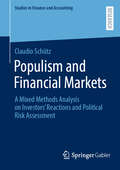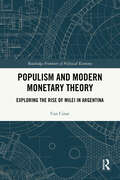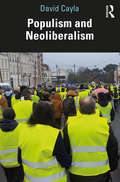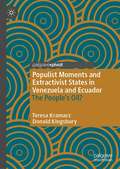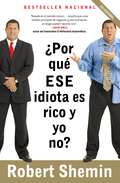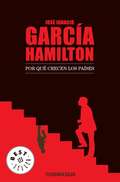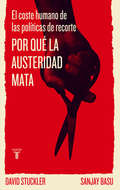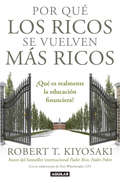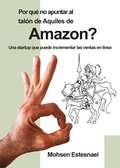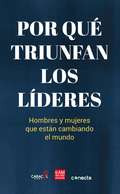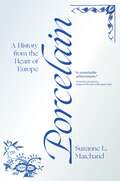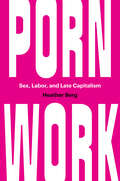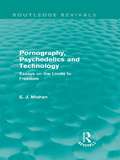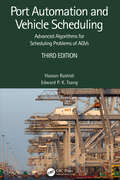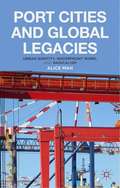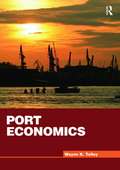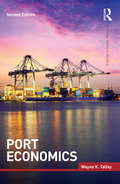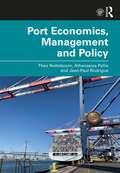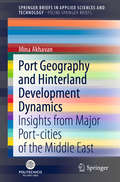- Table View
- List View
Populism and Financial Markets: A Mixed Methods Analysis on Investors' Reactions and Political Risk Assessment (Studies in Finance and Accounting)
by Claudio SchützThe political phenomenon of populism has emerged as a significant force in recent decades, with a profound impact on the economic landscape. This book examines the implications of populism for financial markets, identifying it as a key political risk factor. As populist movements gain ground on a global scale, understanding their influence on financial behavior is essential, not only to navigate the complex investment environment of the present but also to anticipate future developments. The central research question addressed in this book is to understand the impact of populism on investor expectations and political risk assessment in financial markets. The findings suggest that populism increases market uncertainty, raises the returns required by the investors, and thus increases the cost of equity for firms. Emphasizing the need to integrate populist risks into financial assessments, this book provides both theoretical insights and practical guidance for investors, financial managers, and policymakers. It highlights the importance of developing adaptive strategies to manage the evolving risks of populism in global financial markets.
Populism and Modern Monetary Theory: Exploring the Rise of Milei in Argentina (Routledge Frontiers of Political Economy)
by Can CinarCentred on Javier Milei’s recent ascent, this book explores the cyclical nature of Argentina's economic crises and the corresponding rise of populist leaders. It argues that populism represents a revolutionary stance that should be reclaimed by progressive movements, examining the relationship between financial turbulence and populist allure through the lens of heterodox economics, particularly Modern Monetary Theory. It also provides a fresh re-reading of Argentine history leading up to Milei’s presidency, using post-Keynesian framework to analyse the complex interplay between fiscal policies and political ideologies.The book demonstrates how Modern Monetary Theory can theoretically justify expansive fiscal policies central to populist platforms, enriching debates about the economic viability of populist governance. Milei's unique blend of heterodox economic policies and populist rhetoric, characterised by deregulation, privatization, and radical reductions in government spending, presents a crucial juncture for examining intersections between economic principles and populist mechanics. Integrating economic theory, historical context, and political analysis, this work contributes to political economy, heterodox economics, and Latin American studies.
Populism and Neoliberalism
by David CaylaPopulism and Neoliberalism argues that the roots of populism lay in the contradiction between the democratic ideal, which implies that the people should decide, and neoliberal governance, which seeks to make markets and competition the arbiters of major social developments. Neoliberalism is not the product of a clearly conceived ideology but rather a set of doctrines based on a few major principles which have been embraced by decision-makers of all kinds with little reassessment along the way. In practice, a certain art of governing that exploited an economic thinking insensitive to social complexity gradually imposed itself by being wrongly identified as the successor to liberalism. The rise of populist movements poses a significant challenge to liberal democracies, yet the causes of these movements remain beyond the understanding of experts. The explanation of populism is often limited to a mere political analysis. Contrary to that, this book investigates the economic and social dynamics of the free-market system and explains how populism emerges from its imbalances. It also aims to explain the emergence of the neoliberal doctrines during the 1930s and to characterise their common features. In light of this, it explores how the rise of inequality and social discontent create a pressing duty to develop another model, and argues that we must now rethink our policies in depth in order to respond to the challenge of authoritarian populism. This book marks a significant intervention in the debate about the rise and fall of neoliberalism. Its analysis of the links between the failings of neoclassical economics and the failings of neoliberal politics provides essential reading for anyone interested in the damaging impact of neoliberalism, the failings of neoclassical economics, and explanations for the rise of populism.
Populism in America: Fake News, Alternative Facts and Elite Betrayal in the Trump Era
by Rafael Di Tella Sarah McAraDuring the 2016 U.S. election, long-time politician Hillary Clinton, a Democrat, and celebrity billionaire Donald Trump, a Republican, faced off in a contentious race for president. In the primaries, candidates from both major political parties used anti-establishment messaging to appeal to the electorate, a theme that had been on the sidelines of U.S. political discourse for decades. Trump, in particular, played into the rising anti-establishment sentiment as he embraced a populist platform and emphasized his position as a Washington-outsider. He proved to be an unpredictable and incendiary candidate on the campaign trail, garnering much media attention and creating divisions within the traditional Republican base, yet his directness and promise to "Make America Great Again" resonated with several segments of the population. While many experts predicted a Clinton victory, Trump was ultimately elected president in November 2016. During his first 100 days in office, Trump tested the boundaries of the U.S. government, and observers looked on with uncertainty as he took an unconventional and unpredictable approach to policymaking.
Populist Moments and Extractivist States in Venezuela and Ecuador: The People’s Oil?
by Donald Kingsbury Teresa KramarzThis book addresses the intersection of extractivism, populism, and accountability. Although populist politics are often portrayed as a driver of poor environmental governance, Populist Moments and Extractivist States identifies it as an intervening variable at best – one that emerges in response to the accountability deficits of extractive states. Case studies in Venezuela – for many, the prototypical petrostate – and Ecuador – which exchanged agribusiness dependency for oil decades later – illustrate how extractive states are oriented by a colonial logic of export and service. This logic regulates state-society-nature relationships and circumscribes avenues for local stakeholders to hold public officials and extractive industries to account for environmental and human harms. Populist moments of the early 21st century across Latin America responded to these conditions, promising more equitable and sustainable futures. However, rather than reversing the technocracy, verticalism, and exclusion of the recent past, populist moments often intensified and legitimated them in the drive to maximize and distribute resource rents. The result has been cyclical, as populist moments of hope and rupture fall prey to the extractivist states they tried, and failed, to replace.
Por otro camino: De regreso a lo humano
by Carlos Raúl YepesUna invitación a crear conciencia sobre nuestros problemas, el valor de lo humano y la importancia del otro, a desacelerar nuestro ritmo de vida y reconocer la importancia de la ética y la escala de valores en nuestras decisiones. El autor de este libro renunció a la Presidencia del banco más grande del país y con ello renunció a un estilo de vida. En este libro nos plasma el modelo de gestión que implementó y llevó a Bancolombia a la cúspide del éxito. Pero nos cuenta por qué una carta que le escribió su hija lo llevó a irse Por otro camino. La crítica ha dicho "Estas páginas cautivan y desafían a quien se arriesgue a leerlas porque tienen la transparencia genuina de quien ha puesto el alma en la entrega personal al servicio de los demás. Ante la profunda crisis espiritual nacional e internacional, este libro es un mensaje de esperanza porque muestra que sí es posible construir un mundo más humano y en armonía en las organizaciones y entre las personas". Francisco de Roux "En un mundo donde se han perdido los referentes, donde la arrogancia y los estigmas quieren marcar la parada y donde la rabia y la mentira están a flor de piel, este libro es un bálsamo de dignidad y humildad para quienes todavía creen que las grandes transformaciones de la sociedad solo se logran cuando la autoestima de una nación depende de la humanidad de su gente, de la inspiración de sus líderes y de la ética de su convivencia". Alejandro Santos "En el partido de la vida Carlos Raúl ha hecho goles clave; pero en este libro, que es una cancha llena de enseñanzas y experiencias, demuestra que es un jugador que prefiere hacer los pases para que los demás griten gol". James Rodríguez
Por que ese idiota es rico y yo no?
by Robert SheminCíñete a las viejas reglas para ganar dinero y seguirás pobre. Rompe con esas reglas y te harás rico. Este libro te enseñará cómo.En ¿Por qué ese idiota es rico y yo no? Robert Shemin, autor de grandes bestsellers, revela por primera vez los secretos del círculo interno de los mega-ricos. ¿Alguna vez te has preguntado por qué algunas personas atraen la riqueza mientras que otros permanecen atrapados económicamente y endeudados? La clave se encuentra en una manera de pensar poco convencional y favorable a la riqueza. Puede que hayas intentado enriquecerte y no lo hayas logrado todavía, o puede que sólo necesites la confianza necesaria para soñar en grande. En cualquier caso, éste es el libro indicado para ti. En este libro aprenderás a:* Fijar sólo un objetivo, y convertirlo en un objetivo importante * Disfrutar de la vida mientras tu dinero trabaja * Dejar de crear el negocio de otros y empezar a crear el tuyo propio * Vivir y pensar como un millonario mientras te conviertes en uno * Utilizar el poder y el manejo de otros Idiotas Ricos para ayudarte a ingresar en el Club de los Idiotas Ricos * Y mucho más En este libro, el primer libro que te enseñará lo que de verdad se necesita para alcanzar la abundancia económica, Shemin ilustra de manera amena e inteligente que ir contra corriente es, de hecho, la manera más segura de ganar. Dedica unas cuantas páginas a conocer a Robert y a sus amigos Idiotas Ricos, y quedarás convencido de que "si ellos lo lograron, yo también puedo".From the Trade Paperback edition.
Por qué crecen los países
by José García HamiltonPor qué crecen los países presenta a un García Hamilton tan lúcido,polémico y contundente como en cada una de sus obras. Por qué crecen los países pretende responder a una pregunta que en todoel mundo se formula cotidianamente en los ámbitos académicos y de lagente común: por qué algunas naciones "funcionan" y otras no.Describiendo con agilidad la evolución histórica mediante la cualalgunos pueblos han podido elaborar sociedades democráticas y prósperas,José Ignacio García Hamilton nos ilustra sobre libertad y despotismo,ley e instituciones, propiedad privada y socialismo, y desarrolla ideasque son complementarias de las tratadas en El autoritarismohispanoamericano y la improductividad, el libro que lo consagrara comoun autor argentino muy leído y respetado en el mundo hispanohablante yle valiera invitaciones de las Universidades de Cambridge (Inglaterra),Harvard, Georgetown, Wisconsin y varias otras de Estados Unidos.Con observaciones válidas para todas las repúblicas de la AméricaEspañola, con agudas comparaciones entre el mundo anglosajón, latino,alemán y ruso, con elevado nivel académico pero lenguaje llano, Por quécrecen los países presenta a un García Hamilton tan lúcido, polémico ycontundente como en cada una de sus obras.
Por qué la austeridad mata: El coste humano de las políticas de recorte
by Sanjay Basu David Stuckler¿Debe anteponerse la salud de la economía a la de los ciudadanos? Este es el primer libro que afronta el debate político y económico sobre la crisis desde una nueva y muy necesaria perspectiva: su coste humano. La recesión global ha tenido un impacto brutal sobre la riqueza de los países pero todavía ignoramos cómo afecta a un tema esencial: el bienestar físico y mental de sus ciudadanos. ¿Por qué al enfrentarse a crisis similares la salud en algunas naciones (como Grecia) se ha deteriorado gravemente mientras en otras (como Islandia) ha llegado a mejorar? Tras una década de investigaciones, David Stuckler y Sanjay Basu nos demuestran que incluso ante las peores catástrofes económicas los efectos negativos en la salud pública no son inevitables. Es la mala gestión de los gobiernos la que puede conducir a un desastroso saldo de tragedias humanas. Por qué la austeridad mata presenta una conclusión demoledora: los recortes son seriamente perjudiciales para su salud. Son las recetas de austeridad las que agravan fatalmente las consecuencias de las crisis, mutilando programas sociales clave justo en el momento en el que más se necesitan, empeorando el desempleo y obstaculizando la recuperación. Este libro defiende que las decisiones económicas no son únicamente una cuestión de ideologías, de tasas de crecimiento y de déficits presupuestarios, sino también una cuestión de vida o muerte. Solo un sistema más justo e igualitario, acompañado de políticas inteligentes que refuercen las redes públicas de protección, garantizará el bienestar de nuestras sociedades. Reseñas:«Un mensaje explosivo respaldado por una década de investigación y basado en una buena cantidad de datos que están a disposición del público... En su nuevo y potente libro, Por qué la austeridad mata, Stuckler y su colega Sanjay Basu muestran que la austeridad está teniendo un #efecto devastador#sobre la salud pública en Europa y América del Norte.»The Guardian «¿Cuál es el precio de un mercado de valores saludable? En este riguroso análisis económico, el sociólogo David Stuckler y el epidemiólogo Sanjay Basu sostienen que durante una recesión los recortes en gasto social que implica la austeridad erosionan la salud pública... Una llamada aleccionadora a favor de la toma de decisiones informadas y democráticas en respuesta a la recesión.»Nature «Un dramático estudio que destaca algunas de las consecuencias resultantes de la combinación entre las obsesiones ideológicas y la desconsideración burocrática.»Kirkus Reviews «Stuckler y Basu proporcionan un eficaz resumen de los problemas básicos de la austeridad desde la perspectiva económica, aunque la gran contribución de este libro es centrarse en sus efectos sobre la salud... Los autores han descubierto que cuanta más austeridad se ha practicado en un estado o en unpaís más personas han enfermado y más personas han muerto. En resumen, "La austeridad mata" es algo más que un eslogan. La austeridad no funciona desde el punto de vista económico y, además de eso, mata a la gente.»The New Republic «La austeridad mata, y a gran escala. Eso es lo que sostienen David Stuckler y Sanjay Basu en Por qué la austeridad mata, un potente ataque a los intentos de reducir el gasto público desde que se produjo la crisis económica, que convierte a los políticos partidarios de apretarse el cinturón en responsables de la catástrofe sanitaria... Al contar las historias de víctimas individuales a la vez que analiza los efectos de la austeridad sobre la población general, Stuckler y Basu proporcionan abundancia de pruebas de que es mala para nuestra salud. Una contribución valiosa al actual debate.»Financial Times
Por qué los ricos se vuelven más ricos: ¿Qué es realmente la educación financiera?
by Robert T. KiyosakiHace mucho tiempo los ahorradores eran ganadores.Hace mucho tiempo el ahorrador podía ahorrar y enriquecerse. Hoy los ahorradores son perdedores. Por qué los ricos se vuelven más ricos trata de la educación financiera real, no del cuento de hadas que afirma: "Ir a la escuela, conseguir un trabajo, trabajar duro, ahorrar, comprar una casa, salir de deudas e invertir a largo plazo en el mercado de valores". Este libro es la escuela de graduados de Padre Rico, Padre Pobre. Si estás buscando nuevas ideas sobre cómo sobrevivir y prosperar en el futuro, este libro es para ti. En este valioso libro, Robert T. Kiyosaki comparte los aprendizajes y lecciones que aprendió a lo largo de la vida, después de repetidamente hacerse la pregunta: "¿Cuándo aprenderemos sobre el dinero?" Al leer Por qué los ricos se vuelven más ricos, aprenderás: - Por qué la brecha entre los ricos y todos los demás se amplía. - Por qué los ahorradores son perdedores. - Por qué la deuda y los impuestos hacen a los ricos más ricos. - Por qué la educación tradicional realmente hace que muchas personas altamente educadas, como el Padre Pobre de Robert, vivan mal. - Por qué ir a la escuela, trabajar duro, ahorrar dinero, comprar una casa, salir de la deuda e invertir a largo plazo en el mercado de valores es el peor asesoramiento financiero para la mayoría de la gente. - Por qué la educación financiera real nunca se puede enseñar en las escuelas.
Por qué no apuntar al talón de Aquiles de Amazon?: Una startup que puede incrementar las ventas en línea
by Mohsen EstesnaieLas inundaciones están formadas por agua y energía. Cuando estas son destructivas, podemos concluir que están formadas por más agua y energía. El agua es un componente importante de las inundaciones, tal como la energía. Considerando esto, ¿qué convierte una inundación en un desastre? La respuesta es obvia: nuestra ignorancia. Si logramos conducir la terrible inundación hacia una represa, lograremos obtener el agua y la energía para usarlas a nuestro favor. Como consecuencia, podemos transformar algo destructivo en algo que aprovechamos a nuestro favor. La pobreza es como las inundaciones, pero tal vez mucho más fuerte. Cada seis segundos muere un niño por desnutrición y una de cada ocho personas en el mundo están desnutridas. La pobreza es más peligrosa que las inundaciones. En este libro intentaremos aprender a obtener la energía existente en la pobreza y convertirla en creatividad y riqueza.
Por qué triunfan los líderes: Hombres y mujeres que están cambiando el mundo
by Caracol Radio S.A.Pepé Mujica, Ángela Patricia Janiot, Nairo Quintana y Humberto de la Calle, son solo algunos de los 15 líderes y empresarios latinoamericanos cuyos testimonios de éxito se recogen en este libro. "Para ser líder es imprescindible aprender de los maestros. Hemos reunido a algunos de los mejores en este libro para que te entreguen sus consejos y estrategias". Darío Arizmendi, director del programa 6AM Hoy por Hoy En este libro se reúne las mejores conversaciones que ha tenido la mesa de trabajo del programa 6AM Hoy por Hoy de Caracol Radio con algunos de estos grandes líderes y se convierte en un completo diplomado en liderazgo, resiliencia, marketing, estrategia, perseverancia y trabajo en equipo. Un libro que permite adentrarse en las historias de vida de aquellos que tienen muchas cosas por contar y que han cambiado el mundo.
Por una vida plena. Aprovecha tus experiencias de vida y logra el máximo bienestar
by Ernesto D´alessioLa vida es un regalo, no vivas en el "mientras", ¡VÍVELA!Maneja tus adversidades y conviértelas en tus fortalezas, haz que cada minuto de tu vida cuente, ¡aprovéchala!En Por una vida plena encontrarás las mejores recomendaciones para hacer a un lado -y para siempre- prejuicios y temores que obstruyen tu camino; contiene tips reveladores para que te conviertas en una persona segura, decidida y dispuesta a recibir el éxito, la confianza y el amor que mereces.Este libro es un manual práctico, esencial y sincero con 40 conceptos para tomar en cuenta en tu vida antes de llegar a los 40 años, su finalidad es que los lleves a la práctica cuanto antes, para que en unos años puedas voltear y sentirte satisfecho con tu vida.
Porcelain: A History from the Heart of Europe
by Suzanne L. Marchand"This is the book on porcelain we have been waiting for. . . . A remarkable achievement."—Edmund de Waal, author of The Hare with Amber EyesA sweeping cultural and economic history of porcelain, from the eighteenth century to the presentPorcelain was invented in medieval China—but its secret recipe was first reproduced in Europe by an alchemist in the employ of the Saxon king Augustus the Strong. Saxony’s revered Meissen factory could not keep porcelain’s ingredients secret for long, however, and scores of Holy Roman princes quickly founded their own mercantile manufactories, soon to be rivaled by private entrepreneurs, eager to make not art but profits. As porcelain’s uses multiplied and its price plummeted, it lost much of its identity as aristocratic ornament, instead taking on a vast number of banal, yet even more culturally significant, roles. By the nineteenth and twentieth centuries, it became essential to bourgeois dining, and also acquired new functions in insulator tubes, shell casings, and teeth.Weaving together the experiences of entrepreneurs and artisans, state bureaucrats and female consumers, chemists and peddlers, Porcelain traces the remarkable story of “white gold” from its origins as a princely luxury item to its fate in Germany’s cataclysmic twentieth century. For three hundred years, porcelain firms have come and gone, but the industry itself, at least until very recently, has endured. After Augustus, porcelain became a quintessentially German commodity, integral to provincial pride, artisanal industrial production, and a familial sense of home.Telling the story of porcelain’s transformation from coveted luxury to household necessity and flea market staple, Porcelain offers a fascinating alternative history of art, business, taste, and consumption in Central Europe.
Porcini's Pronto: "Great Italian cuisine without the wait!"
by James L. Heskett Richard LueckePorcini's Inc. operates a chain of 23 full-service restaurants located near shopping malls and downtown areas in the northeastern United States. Known for providing excellent service, Porcini's serves high-quality Italian cuisine made from fresh ingredients. Looking for expansion opportunities, management considers launching a new chain of lower-cost, limited-menu restaurants called Porcini Pronto. The new outlets will be located along busy interstate highway exits in the region and will serve outstanding Italian food at reasonable prices to both travelers and local residents. Management is concerned that a poor customer experience at Porcini Pronto could tarnish the company's well-established and successful restaurant brand. The management team asks the vice president of marketing to develop the concept and to create an operating strategy for the new outlets. The VP must also analyze three alternative expansion strategies before management will make any commitments to the project. If Porcini's builds and operates the new restaurants, the company will maintain complete control of operations and the customer experience but expansion will take a very long time. Franchising and syndication are two other options which provide faster expansion but introduce the risk of losing control of the brand. The VP must analyze the options and make his final recommendation.
Porn Work: Sex, Labor, and Late Capitalism
by Heather BergEvery porn scene is a record of people at work. But on-camera labor is only the beginning of the story. Porn Work takes readers behind the scenes to explore what porn performers think of their work and how they intervene to hack it. Blending extensive fieldwork with feminist and antiwork theorizing, Porn Work details entrepreneurial labor on the boundaries between pleasure and tedium. Rejecting any notion that sex work is an aberration from straight work, it reveals porn workers' creative strategies as prophetic of a working landscape in crisis. In the end, it looks to what porn has to tell us about what's wrong with work, and what it might look like to build something better.
Pornography, Psychedelics and Technology: Essays on the Limits to Freedom (Routledge Revivals)
by E. J. MishanFirst published in 1980, Pornography, Psychedelics and Technology: Essays on the Limits to Freedom focuses on the crucial connections between technological growth and the more salient features of social malaise in the latter part of the twentieth century. Professor Mishan is one of the few economists absorbed by the larger social questions, and does not believe that the growth in state intervention and the decline of social liberty are simply the result of intellectual confusion and bureaucratic momentum. He sees them as unavoidable consequences of scientific and technical progress. While agreeing with many of his fellow economists in acknowledging the virtues of a competitive market economy, Professor Mishan is acutely aware of its limitations. Following the growth of self-styled liberation movements, seen as manifestations of a move towards a world of greater individual emancipation and fulfilment, the author nevertheless groups such movements together with the rising indices of violence, suicide, family breakdown and hooliganism, which have become indicative of a growing disorientation and social disintegration. These developments and the hazards they entail, however, are bound up with the rapid scientific and technological progress of the post-war world.
Porsche: The Cayenne Launch
by Jill Avery John Deighton Jeffrey FearCan an online discussion forum supply insight into the evolution of brand meaning? In 2003 Porsche launched a sport utility vehicle, dividing Porsche purists from newcomers to the brand. Vocal members of online and offline Porsche communities ridiculed the Cayenne SUV and disapproved of the new breed of driver. Some opposed offering Porsche Club membership to them, and some even refused to extend the fraternal Porsche "wave" or headlight flashing to them on the road. Porsche's values of speed, luxury, and a certain masculine zeal resonated strongly with its devotees, while drivers of the Cayenne (which came to be known as "the SUV for soccer moms") tended to be safety-conscious, family-oriented, and conservative. Evolving debates on forums allow a class to debate whether the brand had strayed too far from its core values and was at risk.
Port Automation and Vehicle Scheduling: Advanced Algorithms for Scheduling Problems of AGVs
by Hassan Rashidi Edward P. TsangContainer terminals are constantly being challenged to adjust their throughput capacity to match fluctuating demand. Examining the optimization problems encountered in today’s container terminals, Port Automation and Vehicle Scheduling: Advanced Algorithms for Scheduling Problems of AGVs, Third Edition provides advanced algorithms for handling the scheduling of Automated Guided Vehicles (AGVs) in ports. Building on the earlier editions, previously titled Vehicle Scheduling in Port Automation: Advanced Algorithms for Minimum Cost Flow Problems, this book has undergone extensive revisions and includes two new chapters. New material addresses the solutions to the modeling of decisions in Chapter 3, while in Chapter 11 the authors address an emerging challenge in automated container terminals with integrated management. Key Features: ◾Classifies the optimization problems of the ports into five scheduling decisions. For each decision, it supplies an overview, formulates each of the decisions as constraint satisfaction and optimization problems, and then covers possible solutions, implementation, and performance. ◾Explores in Part One of the book the various optimization problems in modern container terminals, while details in Part Two advanced algorithms for the minimum cost flow (MCF) problem and for the scheduling problem of AGVs in ports. ◾Offers complete package that can help readers address the scheduling problems of AGVs in ports. This is a valuable reference for port authorities and researchers, including specialists and graduate students in operation research. For specialists, it provides novel and efficient algorithms for network flow problems. For students, it supplies the most comprehensive survey of the field along with a rigorous formulation of the problems in port automation.
Port Cities and Global Legacies
by Alice MahThis book advances the concept of 'global legacies' - enduring forms, processes, or ideas of the 'global' that shape urban identity and politics. Global legacies provide a key lens on the difficult pasts and uncertain futures of cities. In particular, port cities, with their distinctive global dynamics, long histories of casual labour, large migrant communities, and roles within international trade networks, exhibit fascinating global legacies. Employing a rich methodological repertoire, Alice Mah combines approaches from critical political economy, global history and sociology, and ethnographic case study methods in this comparative study. The result is a careful examination of the contradictory legacies of empire, capitalism, casual labour, and radicalism in Liverpool, Marseille, and New Orleans. These major port cities faced painful processes of ruination followed by attempts at recovery in the recent past. This book reveals that while global legacies are fraught and contradictory, they also offer a framework of possibilities and resources for imagining alternative urban futures.
Port Competition in the Pearl River Delta
by Willy ShihThis case examines the competition between ports and port operators in the Pearl River Delta over the last four decades. The cities surrounding the Pearl River estuary are the "workshop of the world," and the development of manufacturing in the region was heavily dependent on efficient container shipping. As China has opened up and drawn more direct trade traffic to Shenzhen and Guangzhou ports, the operators in Hong Kong have had to adapt. More change is afoot, and Hong Kong may have to reinvent itself again.
Port Economics
by Wayne K. TalleyPort Economics is the study of the economic decisions (and their consequences) of the users and providers of port services. A port is an "engine" for economic development by providing employment, worker incomes, business earnings and taxes for its region. The book provides a detailed discussion of types of carriers that use ports, the operation of cargo and passenger ports as well as the operation of such specific ports as Hong Kong, Hamburg, Le Havre, Savannah, Miami and Panama. Port Economics is the first contemporary textbook of its kind. It enhances our understanding of port economics by – classifying port users and suppliers of port services in the context of economic demand and supply curves; denoting that the demand for port services has two prices, the price paid to the port by the users and the price (or actual and opportunity costs) incurred by port user carriers, shippers and passengers; presenting the economic theories of carriers, shippers and passengers. The numerous up-to-date references will be of benefit to students and researchers of the economics of the shipping trade; to government officials in developing port and shipping policies; and to port operators in understanding the port-choice selection process by shipping lines and other carriers.
Port Economics (Routledge Maritime Masters #Volume 16)
by Wayne K. TalleyPort Economics is the study of the economic decisions (and their consequences) of the users and providers of port services. A port works as an "engine" for economic development. This book provides a detailed discussion of port freight service users, such as freight water and land carriers, that have their ships and vehicles serviced and their cargoes unloaded by ports, as well as passenger services such as ferry carriers which are serviced by ferry passenger ports. This text continues to enhance our understanding of port economics by exploring the economic theories, supply and demand curves, and the actual and opportunity costs relating to the carriers, shippers and passengers who use ports. This new edition has been updated throughout. This includes: An expanded discussion of container, break-bulk, dry-bulk, liquid-bulk and neo-bulk ports; An introduction of port service chains, hinterland transport chains, maritime transport chains and port multi-service congestion; A discussion of seaborne trade, dry ports, port centrality and connectivity and free trade zones. This updated and comprehensive introduction to port economics will be of benefit to students and researchers in their study of port economics and management. It is also of great importance to professionals who manage and operate ports as well as freight and passenger carriers.
Port Economics, Management and Policy
by Jean-Paul Rodrigue Theo Notteboom Athanasios PallisPort Economics, Management and Policy provides a comprehensive analysis of the contemporary port industry, showing how ports are organized to serve the global economy and support regional and local development. Structured in eight sections plus an introduction and epilog, this textbook examines a wide range of seaport topics, covering maritime shipping and international trade, port terminals, port governance, port competition, port policy and much more. Key features of the book include: Multidisciplinary perspective, drawing on economics, geography, management science and engineering Multisector analysis including containers, bulk, break-bulk and the cruise industry Focus on the latest industry trends, such as supply chain management, automation, digitalization and sustainability Benefitting from the authors’ extensive involvement in shaping the port sector across five continents, this text provides students and scholars with a valuable resource on ports and maritime transport systems. Practitioners and policymakers can also use this as an essential guide towards better port management and governance.
Port Geography and Hinterland Development Dynamics: Insights from Major Port-cities of the Middle East (SpringerBriefs in Applied Sciences and Technology)
by Mina AkhavanThis book illustrates and discusses the main characteristics of port-city development dynamics with a focus on the fast-growing city-states of the Middle East, which are emerging as key players in logistics and the global supply chain. Maritime ports and the cities hosting them have long fascinated scholars – geographers, economists, architects, urban planners, sociologists etc. – as they become centres of exchange where different social and urban environments meet, at the intersection between land and sea. Given that the current body of literature on the topic is biased – mainly concerning the Western world and East Asian region – with mono-disciplinary tendencies, this book outlines a theoretical basis from a wide range of literature, linking port-city studies, globalization theories and logistics, and adopts a multidisciplinary perspective. The main target audience of the book includes scholars and graduate students in urban studies, spatial planning, urban and regional economics, logistics, geography and transport geography with an interest in studying port geography and the port-city interface, port infrastructure development and port hinterland dynamics; it will also benefit policymakers and urban planners whose work involves these topics.
